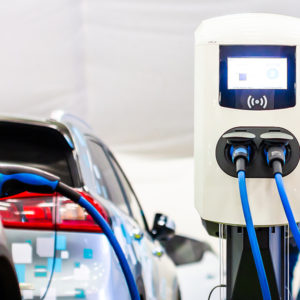There is no doubt that the electric vehicle revolution is here, especially after President Joe Biden’s executive order outlining the target of making half of all new vehicles sold in 2030 to be EVs. Although this is an exciting step forward in reducing emissions that contribute to the climate crisis, Biden’s bold proposal is destined to fail if outdated state regulations remain on the books. Specifically, dealer franchise laws that ban direct-to-consumer sales for electric vehicles.
Currently, 29 states have regulations that either limit or completely ban consumers from purchasing vehicles directly from a manufacturer. If you live in one of the 17 states that has a complete ban, that means you can only purchase an EV from a licensed dealership. This outdated law, which does nothing but protects the dealer franchise model from innovative competition, all but ensures consumers in those states don’t have access to vehicles manufactured by companies like Tesla, Rivian, Lucid, and Lordstown. For example, in order for a consumer in Alabama to purchase an EV from one of those manufacturers, they would have to buy their car in Florida, load it on a flatbed, and drive the flatbed to an Alabama DMV office to register it. If the bans and onerous hurdles remain in place, it is naive to think Biden’s mandate would be even remotely achievable.
What makes these bans on direct-to-consumer sales even more problematic is that consumers are already purchasing cars online, in the used vehicle market, which is legal nationwide. We have seen an increase of online vehicle purchases as consumers prefer the transparent pricing, quick buying process, and convenience of having their vehicle delivered directly to their home. So the question remains if you can buy a used car online, what justification could exist to ban you from buying a new EV online?
The answer is uncomfortable where state politicians are beholden to the dealer franchise model and the power they flex in lobbying state lawmakers. It is an irritating, yet simple, example of the existing industry lobbying to restrict consumer access to maintain its market share.
Getting rid of outdated laws would drastically expand consumer choice, and help lower prices, but the benefits are not limited to one’s pocketbook. In addition to financial considerations, allowing for direct-to-consumer sales eliminates the possibility of a car salesperson inflicting any personal biases they may have onto the buyer, making the experience more comfortable for consumers as a whole.
Another glaring issue with the direct-to-consumer sales bans is they often limit or ban EV companies from having service centers throughout all 50 states. For example, if you own a Tesla in South Carolina and need it to be serviced, you will have to drive to another state to visit a service center. Depending on what needs to be done to the vehicle, that could pose a significant safety risk for all drivers and passengers on the road. Eliminating the direct-to-consumer sales ban is crucial as it will not only increase EV accessibility for consumers but will also help keep America’s roads safe.
Beyond problematic direct-to-consumer sales bans, consumers are often hit with exorbitant registration fees when they purchase an EV. As it stands, 28 states currently have higher registration fees for EVs than for standard gasoline vehicles. Ohio, for example, charges $31 to register your standard passenger vehicles, $100 for hybrid vehicles, and $200 for fully electric vehicles, which is actively discouraging consumers from owning EVs. Those higher registration fees were created to offset the state’s lost revenue from gas taxes to help pay for infrastructure and administrative costs, but it is unfair that EV consumers who make the greener choice and use less gas are being forced to carry the financial burden. Instead of perpetuating revenue-generating penalties onto EV consumers, a better path forward would be embracing technology neutrality in registration fees by treating standard passenger vehicles and EVs the same, which is the approach Florida has taken.
Although some consumers want access to EVs, Biden’s executive order won’t help them get it if changes aren’t made at the state level. In order to reach the ambitious 2030 goal, Biden should work with states to reduce the harsh regulatory barriers currently preventing consumers from fully accessing and embracing electric vehicles. If these laws aren’t changed, the EV boom may end up fizzling out.

